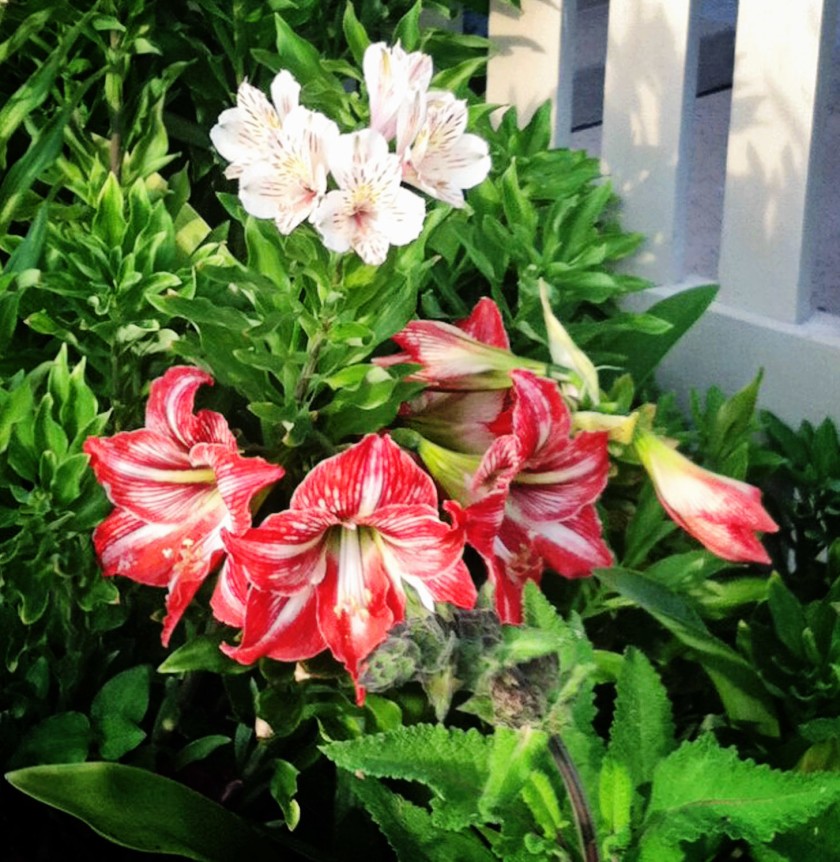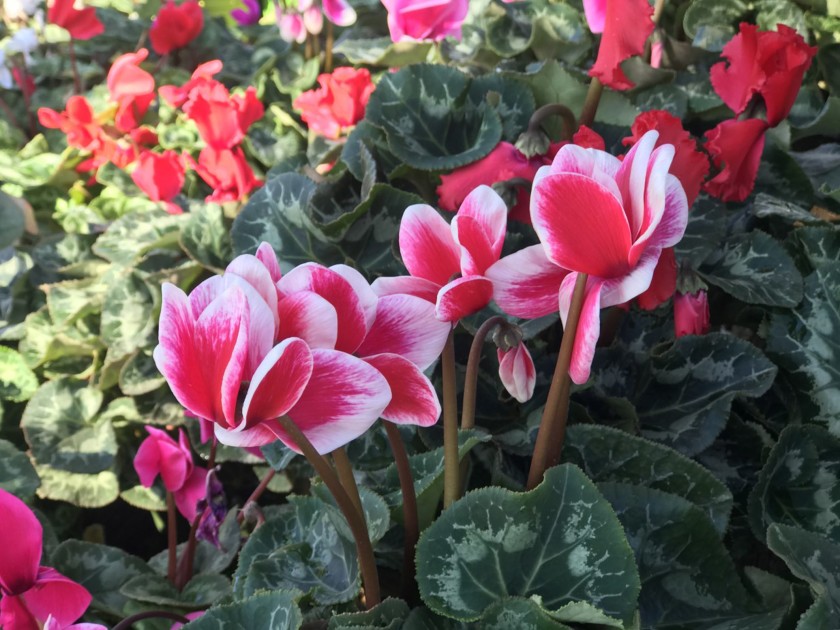Cyclamen, amaryllis and paperwhite narcissus add to the spectacle

“Forcing” amaryllis bulbs indoors requires special care, but the end result are these colorful blooms.(Gordon Ferrari )
By SUZIE HEAP
(This article originally appeared in The san Diego Union Tribune, December 2020)
Have you noticed when you mask up and venture out to shop a bit in this COVID-19 world that holiday decorations are everywhere, waiting to be brought home? Happily, this includes local nurseries — as, for me, holiday decorations are not complete without plants like cyclamen, amaryllis and paperwhite narcissus.
Cyclamen is a wonderful plant that comes in many colors: red, pink, maroon and white and has beautiful variegated green heart-shaped leaves. These plants are most often grown indoors in pots and will reward you with six to eight weeks of beautiful blooms. They like to be on the cool side with plenty of natural light, but NOT in direct sun on a windowsill. If you keep your home at a very warm temperature, you may want to place your cyclamen plants on your balcony or front porch at night.
For impact, try clustering your cyclamen plants, still in their nursery pots, in a decorative container or basket. Be sure to first remove the foil wrap. You will want to water these plants when the soil feels dry to the touch, and be careful to not wet their flowers or leaves. If in a decorative container, lift the potted plants out and water only the soil or place them in a saucer of tepid water and let the plants soak up water for a couple of hours. Pour the water out of the saucer and place the potted cyclamens back in their decorative container.
After six to eight weeks when the leaves yellow and flowering stops, cease watering the plants. Place them in a cool dry place and wait for new growth and flowers the following autumn.
For an easy way to add another festive holiday accent, try “forcing” amaryllis bulbs indoors in a pot with a planting medium or in a glass container with pebbles and water. “Forcing” the bulbs makes for a great do-it-yourself family project and will flourish from November until April.

Cyclamen plants are usually grown indoors, but they thrive where it’s cool, away from direct sun.(Leslie Crawford / UCCE San Diego Master Gardener)
You will need a heavy glass container or Mason jar or you can buy one especially made for forcing bulbs in water. Be sure to use a container that fits the size of the bulb, usually 5 to 8 inches tall and heavy enough to hold up the heavy flower stem, leaves and flowers without tipping over. Decorative pebbles, marbles or small black beach rocks will also be needed to stabilize the bulb and hold it above the water. Only the roots should be in the water, as the bulb will rot (and stink) if it is submerged.
Place several inches of pebbles in the bottom of your glass container so that the roots are hidden but the bulb is out of the water. Rotate the container as you work to fill it slowly and carefully with pebbles so that the bulb will stay centered. If the amaryllis bulb does not yet have any roots growing from it, you can fill the container with many pebbles.
Place the bulb in the container with the pointy side up, on top of the pebbles. Fill the container with room temperature water so that the waterline remains BELOW the bottom of the bulb. A turkey baster is helpful to remove or add water.
Place your container holding the bulb in a sunny location and within a few weeks the bulb will start to grow. It’s fine if the leaves start to grow before the flower stem. To keep the water fresh and clean, once a week, pour out the water gently so as to not touch the bulb and add fresh water to below the bulb. Sit back and enjoy your beautiful amaryllis bloom.
Generally, paperwhite narcissus has a musky fragrance, which some people do not enjoy. For them, Inball and Wintersun Paperwhites are nearly fragrance-free and can be purchased online from bulb nurseries. Like the amaryllis, these can be grown in a glass container using the same water and pebble directions as the amaryllis. Since the bulbs are much smaller, you can place more than one in your container. Place your paperwhites in a cool location and then move them to a sunny location when the bulbs start to grow.
Wishing you happy, safe and plant-filled holidays!
Suzie Heap taught elementary student for 21 years in the Chula Vista Elementary School District. She is a member of the UCCE San Diego County Master Gardener Class of 1994. Get free gardening advice on the Master Gardener Hotline, (858) 822-6910, or by email at gro.dsrenedragretsamnull@pleh. Due to COVID-19, the Master Gardener Hotline staff members are working remotely to ensure they respond to your questions in a timely manner.

